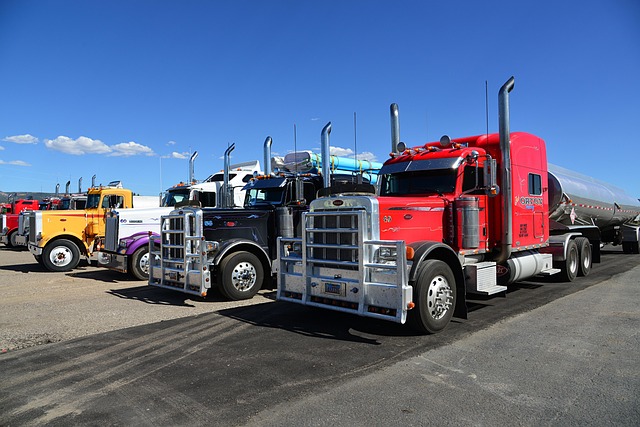New businesses in the trucking sector face complex risks including vehicle accidents, cargo damage, regulatory non-compliance, and weather-related delays. Effective risk management through comprehensive trucking insurance is crucial for survival. This involves identifying industry-specific hazards, utilizing risk assessment tools, implementing preventive measures, staying informed about trends, and developing contingency plans. Proactive risk management ensures operational continuity, safety, and preparedness against unforeseen challenges. Tailored trucking insurance coverage options protect assets and safeguard new businesses' financial stability during their initial turbulent years.
Managing risks effectively during a business’s early years is crucial for its long-term success. This comprehensive guide explores essential strategies to navigate uncertainties, focusing on truckling insurance and risk mitigation techniques for new ventures. We delve into understanding specific risks in the initial operational phases, assessing and prioritizing key areas, and implementing robust risk management plans. By following these steps, new businesses can mitigate potential threats and thrive in a dynamic market, ensuring their resilience with adequate trucking insurance coverage.
Understanding Risks in the Early Years of Operation

In the early years of operation, new businesses face a unique landscape brimming with potential risks. This period is often characterized by rapid growth, experimentation, and uncertainty, making it imperative for startups to cultivate a robust risk management strategy. One of the cornerstones of effective risk management is comprehensive understanding. Businesses must identify and assess risks specific to their industry, operations, and market dynamics. For instance, in the trucking insurance sector, risks could encompass vehicle accidents, cargo damage, regulatory non-compliance, or operational delays due to weather conditions.
Understanding these risks enables new businesses to make informed decisions, implement preventive measures, and develop contingency plans. They can leverage tools like risk assessment matrices, scenario planning, and data analytics to quantify potential losses and identify areas for improvement. Moreover, staying abreast of industry trends, competitor strategies, and evolving regulatory frameworks is vital to anticipate and mitigate emerging risks, ensuring a smoother sailing through the initial challenging years.
Assess and Prioritize: Identifying Key Risk Areas

When starting a new business, particularly in the trucking industry, assessing and prioritizing risks is a critical step to ensure smooth sailing in the early years. Begin by conducting a thorough analysis of your operations, focusing on potential hazards unique to the trucking sector such as vehicle accidents, cargo damage, or regulatory compliance issues. Identify areas where insurance coverage might be lacking and assess the financial impact these risks could have on your young enterprise.
Prioritization is key; not all risks are created equal. Concentrate on identifying high-consequence, low-frequency risks that pose a significant threat to your business’s longevity. These could include major accidents or legal issues with substantial financial penalties. Conversely, lower-consequence, more frequent risks can also be managed but may warrant less immediate attention. Proper prioritization will help guide your decision-making process for risk mitigation strategies, including obtaining adequate trucking insurance coverage.
Strategies for Effective Risk Mitigation in New Businesses

In the early years of operation, new businesses face a unique set of challenges when it comes to risk management. A solid strategy for effective risk mitigation is essential to navigate the uncertainties inherent in any startup journey. One key aspect is securing appropriate trucking insurance. For new ventures involving transportation or logistics, comprehensive coverage can shield against potential liabilities and losses associated with accidents, cargo damage, and legal claims. This proactive step not only ensures operational continuity but also fosters a culture of safety and responsibility.
Additionally, businesses should invest in risk assessment tools to identify and prioritize potential hazards. Regular reviews and updates to risk management plans are crucial as the business environment evolves. Implement processes that encourage open communication and encourage employees to report concerns or near-miss incidents. By fostering a risk-aware culture, new businesses can proactively address vulnerabilities, ensuring better preparedness for unforeseen events.
The Role of Trucking Insurance in Risk Management

For new businesses entering the trucking industry, managing risks effectively is paramount. One crucial component often overlooked is the role of trucking insurance in risk management strategies. This type of insurance serves as a shield against potential liabilities and financial losses that can arise from accidents, cargo damage, or legal issues. By investing in comprehensive trucking insurance, startups can protect their assets and ensure operational continuity.
Trucking insurance for new businesses offers various coverage options tailored to specific needs. These include liability insurance, which covers damages caused to others, as well as physical damage coverage for the truck itself. Additionally, cargo insurance protects against losses incurred during transit, ensuring that valuable goods remain secure. With these insurances in place, new trucking operations can navigate the early years with peace of mind, knowing they have a robust risk management system in place.
Managing risks effectively during a new business’s early years is crucial for its long-term success. By understanding, assessing, and prioritizing potential hazards, entrepreneurs can implement robust risk mitigation strategies. This includes leveraging tools like trucking insurance tailored to the unique challenges of the transportation industry. With the right approach, businesses can navigate uncertainties, foster growth, and thrive in a competitive market.
